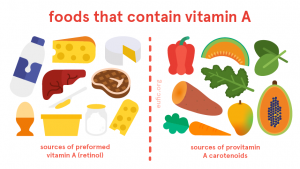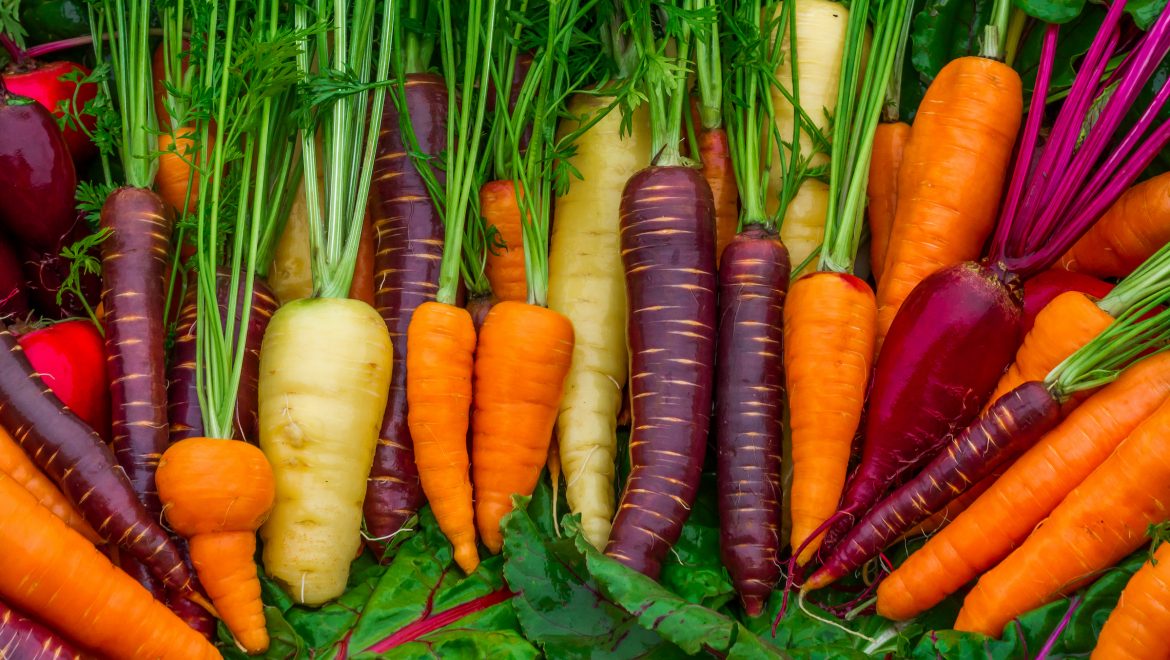The first vitamin discovered was named vitamin A (how original!).
Vitamin A is an essential vitamin in our immune system’s defence against infections. It is also essential for the integrity of mucous membranes and epithelial cells in the respiratory tract and gut.
Symptoms of vitamin A deficiency are dry skin, dry eyes, throat and chest infections, night blindness (YES it’s true, carrots do help you see in the dark!), delayed growth, infertility, poor wound healing, and acne breakouts. Retinol (vitamin A) is often prescribed for acne.
The RDI is 3,000 IU (900 mcg) for men and 2,310 IU (700 mcg) for women per day. Vitamin A is a fat-soluble vitamin meaning it is stored in the body, in the liver. It can take up to two years for deficiency signs to appear. This doesn’t mean that deficiency is uncommon though. Vitamin A is measured in IU and mcg, so be aware when comparing if they have different values.
Food Sources and their Approximate Vitamin A Content per 100g:
- Cod liver oil – 100,000 IU (international units)
- Liver – 18,000 IU (due to animals storing vitamin A in their liver)
- Butter – 2,500 IU
- Cheddar cheese – 1,000 IU
- Parmesan – 974 IU
- Brie/camembert cheese – 820 IU
- Blue cheese – 763 IU
- Eggs – 520 IU
- Feta – 422 IU
- Salmon – 50 IU
Beta-carotene is a carotenoid often called ‘pro-vitamin A’ because it is converted into vitamin A in the body. Beta-carotene and vitamin A are often used interchangeably but they are found in very different foods. Vitamin A is more easily absorbed from animal foods. Beta-carotene is found in orange, yellow and green vegetables.
Food Sources and their Approximate Beta-Carotene Content per 100g:
- Carrots – 16706 IU
- Pumpkin – 8513 IU
- Spinach – 8100 IU
- Silver beet – 6116 IU
- Kale – 4812 IU
- Rockmelon – 3382 IU
- Apricot – 1926 IU
- Mango – 1082 IU
- Papaya – 950 IU
- Peas – 765 IU
- Broccoli – 623 IU
- Capsicum – 370 IU
- Peach – 326 IU
- Nectarine – 332 IU
- Corn – 187 IU

Some people with leaky gut syndrome cannot convert beta-carotene to vitamin A very effectively. This is due to certain co-factors (vitamins and minerals) being required for the conversion process, to convert one substance into another in the body. People with leaky gut (due to malabsorption) may be deficient in the nutrients the body needs for this conversion to happen optimally. You might be able to figure this out if you eat plenty of beta-carotene but still have symptoms of vitamin A deficiency. People with compromised gut function are recommended to eat vitamin A foods rather than relying on beta-carotene.
Supplementing in vitamin A is not necessary for the majority of people. Definitely do not supplement in vitamin A during pregnancy as it can cause birth defects and liver toxicity. It is safer to consume beta-carotene from fruit and veges during pregnancy. If you do suspect vitamin A deficiency, cod liver oil is a great functional food that contains vitamin A along with omega 3 and sometimes, vitamin D.
*Extract from my book MY NUTRITION MENTOR by Liv Kennedy

Check out my blog Be a Limey – Vitamin C
Your Nutrition Mentor,




